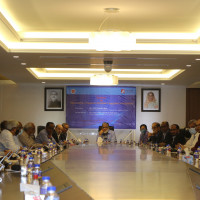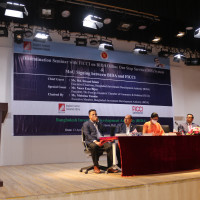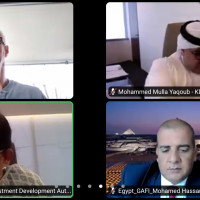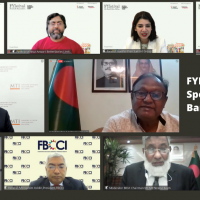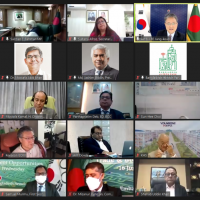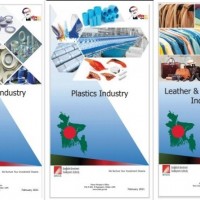Chief Adviser's Office
Investment News
Supporting SMEs hardest hit by COVID-19
Apr 16, 2020
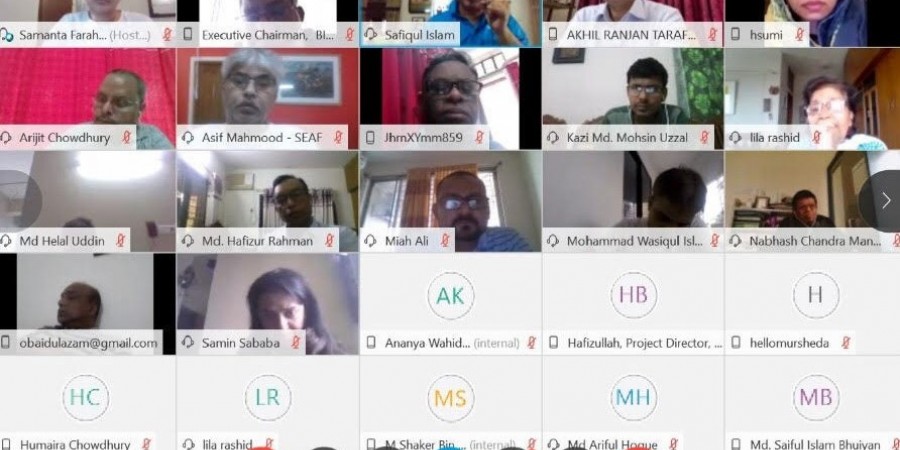
SMEs lie at the heart of the Bangladesh economy, contributing to over 31% of the GDP. The sector engaging 7.8 million people is among the hardest hit by the pandemic. Rescuing these businesses through swift fiscal and policy measures is integral to preserving employment, supply chains and overall productivity.
As the bridge between the government and the private sector, BIDA organized a ‘Brainstorming session on Rapid and Recovery Responses of COVID-19 for Small and Medium Enterprises (SMEs)’.
The dialogue was chaired by BIDA Executive Chairman Md. Sirazul Islam. “We plan to communicate SME concerns to the central bank and support the bailout and promote model and packages, bringing in best global practices,” he said.
Representatives of the Bangladesh Bank, SME Foundation, Ministry of Commerce, Ministry of Industries, Bangladesh Small & Cottage Industries Corporation (BSCIC), BRAC Bank, Goose Limited, Frontier Technologies Limited and International Finance Corporation participated in the session.
BIDA officers participated in the session and officially shared the recommendations gathered from this session with concerned ministries, departments and agencies.
Below are some major recommendations.
Government’s stimulus
The government has announced a stimulus package worth Tk 20,000 crore for cottage, micro, small and medium (CMSME) businesses, 15 percent of which is meant for small businesses in rural areas.
Fifty percent is meant to support the manufacturing sub-sector, 30 percent is for service and 20 percent for trading, as per the circular. On Apr 12, a new stimulus package worth Tk 5,000 crores was announced for small and medium farmers in rural areas.
Seventy percent SMEs are in rural areas
The government has announced a separate package for helping cottage, micro, small and medium enterprises, which means their needs will be better addressed, said SME Foundation Managing Director Md Safiqul Islam.
“Seventy percent of the SMEs are located in the rural areas of Bangladesh, so innovative measures are needed to reach them.”
Before the pandemic, entrepreneurs from small ethnic minority groups and people with disabilities were entering the market, he said. “These communities need our support. Small businesses and women are safest for investment. But despite that women-run SMEs receive only around 4 percent of loans.”
BB will proactively update circular
Running businesses will get working capital, so will businesses that did not previously access loans, said Lila Rashid, General Manager, SME & Special Programmes Department, Bangladesh Bank. Manufacturing and service sector are being prioritized as per the Honourable Prime Minister’s decision.
Micro and cottage industries usually do not have audited balance sheets, which is not a problem. As per the central bank’s guidance, written records of production, sales and turnover will be accepted in loan applications, she said.
“The circular we issued to provide policy support to banks is not a repetition of past circulars. The money is not sourced from revenue, rather a fund has been created, which the banks will provide. Updating the circular to meet evolving needs is not an issue and can be done anytime.
“Reaching out to cottage industries is a challenge. To address that scenario, we have to think beyond banks.” As for risk-sharing, she agreed that a credit guarantee scheme will allow banks to help more businesses.
MoI to create forum with stakeholders
The Ministry of Industries has gotten recommendations from stakeholders, focusing on livelihood support and estimating loss, said Md. Helal Uddin, Additional Secretary, Ministry of Industries. “We are listing entrepreneurs in the value chain and working to create a forum with all stakeholders.”
Loans must be user friendly
The Bangladesh Bank should conduct stakeholder consultation to make these loans more user-friendly, said Md. Mostaque Hassan, Chairman, BSCIC.
Banks must help women-run SMEs
In the past, banks have been reluctant to provide loans to women without collateral, despite the terms set by the central bank, said Mita Bose, Managing Director, Goose Limited. “These issues still exist and must be addressed thoroughly so that businesses can get the help they need.”
Businesses need stimulus loans before Eid
“I work in water treatment. Our peak business period is in summer,” said Humaira Chowdhury, Co-Founder & Managing Director at Frontier Technology Limited. “We are experiencing crunch in capital and our operation flow is hampered.”
Before the pandemic, Frontier was transitioning from a small to a medium enterprise, she said. “Sustaining our growth is important. At the same time, banks must be careful to not give away loans to frauds.”
Support e-commerce, Facebook-based businesses
The central bank should come up with a comprehensive policy to prevent banks from inserting rules for loan recovery, said Hafizur Rahman, Joint Secretary, Ministry of Commerce. “We should also think about the 1,500 e-commerce entities and 20,000-30,000 Facebook-based businesses. These usually don’t access loans, so we must find ways to support them.”
Stakeholder consultation, data and recovery
Stakeholder consultation may be needed for updating the Bangladesh Bank’s circular. “Entrepreneurs who cannot pay rent, salaries might need policy support,” said Miah Rahmat Ali, senior private sector specialist, IFC. “Costs related to licenses and permits can be freed. SMEs can also move towards producing essential products.”
Quantifiable data is needed for effective policy intervention, said Ananya Wahid Kader, senior financial sector specialist, IFC. “Priority may be given to top SME sectors based on GDP contribution, capability and employment generation.” Non-banking, micro-finance mechanisms may be needed. The IFC is preparing to do a survey on SMEs to know demand side and credit access problems and share the data with the government.
“We are not addressing the recovery phase enough,” said Hosna Ferdous Sumi, Private Sector Specialist, IFC. “Many businesses will have to transition online. We still don’t know what their needs will be. IFC is preparing to provide them technical support.”
Banks need risk-sharing to extend support beyond tested base
Seventy percent of businesses are closed, said Syed Abdul Momen, Head of SME Banking, BRAC Bank Limited, who shared valuable insights from the bank’s survey conducted amongst 5000 of its current SME clients in the first week of April.
“Those operating now are e-commerce platforms, small pharmacies, grocers and agro-processing units. But their sales are down by half. They are operating with 40 percent of their usual workforce. Since supply chain is disrupted, they can continue with their inventory for one month and half.
“As or cash flow, 86 percent say cash flows are blocked and they can afford rent for a few more days. They can’t afford to pay EMIs. But most say they will pay and keep employees. Reserve fund will have to be accessed. They hope to bounce back in three months after end of lockdown.”
Based on the findings, BRAC Bank is providing three-month moratorium for loan repayment, he said. Businesses that have been shut down will need working capital after lockdown and those who are operational want some working capital now.
The majority have asked the bank to help with supply, since their usual supply links have become non-functional. “BRAC is therefore allowing clients to access its 1.5 lakh-strong network.
“As per the existing circular, we can give working capital support to our base. Since the risk lies on banks, we will give support to tested clients. If there is credit guarantee fund, we can help more people.”
Participants
- Md. Sirazul Islam, Executive Chairman, BIDA
- Md. Kamrul Hasan, Executive Member -1, BIDA
- Nabhash Chandra Mandal, Executive Member - 3, BIDA
- Md. Ariful Hoque, Director - Registration & Incentives-1, BIDA
- Mohammad Saiful Islam Bhuiyan, Director (Supplier & Linkage Development), BIDA
- Abul Khair Mohammad Hafizullah Khan, Project Director (Entrepreneurship Creation and Skill Development Project), BIDA
- Mohammad Khalid Hossain, Director (Registration and Incentives Local Industry), BIDA
- Mohammad Wasiqul Islam, Deputy Director (Registration and Incentives - Local Industry), BIDA
- Kazi Md. Mohsin Uzzal, Deputy Director (Registration- Local Counseling), BIDA
- Shah Mohammad Mahboob, Director (Registration & Incentives Foreign Industry), BIDA
- Samin Sababa, Consultant, BIDA
- Lila Rashid, General Manager, SME & Special Programmes Department, Bangladesh Bank
- Arijit Chowdhury, Additional Secretary, FID
- Md. Obaidul Azam, Additional Secretary, Ministry of Commerce
- Md. Hafizur Rahman, Joint Secretary, Ministry of Commerce
- Md. Helal Uddin, Additional Secretary, Ministry of Industry
- Md. Mostaque Hassan, Chairman, BSCIC
- Md Shafiqul Islam, Managing Director, SMEF
- Akhil Ranjan Tarafder, Manager (Research Wing), SMEF
- Asif Mahmood, Managing Director, SEAF
- Ms. Humaira Chowdhury, Managing Director, Frontier Technology Ltd.
- Mita Bose, Managing Director, Goose Ltd.
- Syed Abdul Momen, Head of SME, Brac Bank Ltd
- Nuzhat Anwar, Senior Country Officer (Bangladesh, Bhutan and Nepal), IFC
- Miah Rahmat Ali, Senior Private Sector Specialist, IFC
- Ananya Wahid Kader, Senior Financial Sector Specialist, IFC
- Hosna Ferdous Sumi, Private Sector Specialist, IFC
- Noor Ahmed Naveed, Operations Analyst, IFC
- Samanta Farahnaz, Consultant, IFC
- Shaker Bin Shams, Consultant, IFC
- Rakib Hassan, Consultant, IFC
- Redwan B Rokon, Consultant, IFC



